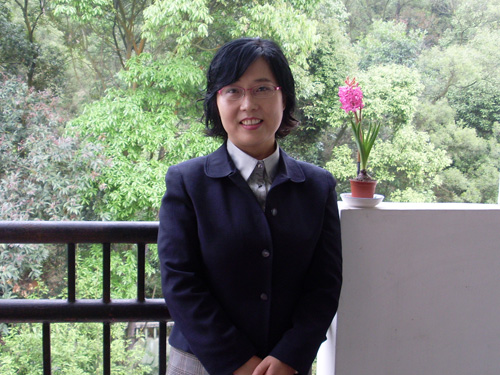April 9 - With her fluent spoken Chinese, northeast Asian face and shy smile, Dr.Cho Younghwa could easily pass as a Chinese teacher on the GDUFS campus. A full-time lecturer from Korea in the Faculty of Asian Languages and Cultures, Dr.Cho is loved by her students as a teacher who is kind, gentle, and dedicated, though a little shy .
Cho earned a BA in Chinese from Konkuk University in Korea, then continued her education at Taiwan University. After Mainland China and South Korea normalized diplomatic relations, she received a doctorate degree at Beijing Normal University, becoming an expert in ancient Chinese characters.

Dr. Cho Youngwa
The following is an English translation of an interview with Dr.Cho.
Journalists: You've continued studying Chinese, or to be precise, ancient Chinese characters since college. What makes you so interested in that field?
Dr.Cho: Well, I guess my family has had a great influence on me. My grandfather taught classical Chinese, and so did my father. I took interest in Chinese language when I was a young girl. It seemed to me that studying Chinese was something that I was meant to do.
Journalists: After living in China for over a decade, do you think you've adjusted to life here? How do you like this country? What thoughts do you have to share with us?
Dr.Cho: Strangely speaking, I sometimes feel I'm more like a Chinese person than a Korean in character. Chinese people, compared with Koreans, are more straightforward, and that's the way I am. In this case, I could say I fit in pretty well.
China appeals to me, and what fascinates me most is its culture. China has a culture that's rich and profound. Different philosophies like Confucianism, Buddhism, Daoism, Mohist have coexisted for so long, and will continue to do so. Nurtured by such a variety of theories and beliefs, Chinese people have developed a flexibility of mind, as well as a broad perspective.
I believe that Chinese culture will have a far-reaching impact internationally. In Korea, the popularity of Chinese language studies is second only to English studies in popularity. There are many exhibitions of Chinese culture and art.
But it worries me to see that Chinese students nowadays, particularly those majoring in foreign languages, haven't fully realized how precious their own culture is. It's necessary that they pay more attention to preserving their culture and spirit. I hope that Chinese students will accept ideas from other civilizations on the basis of a love for their own culture.
Journalists: Before this interview, we heard that you're an exceptionally dedicated teacher. As the only foreign teacher in the Korean department, do you feel pressure?
Dr.Cho: (smiling shily) Thank you for the compliment. I always try to do the best I can, but I'm afraid I'm far from being as good as you say.
Of course pressure does exist, especially now that I'm compiling a textbook with other teachers on Korean language. But I'm happy with teaching. My colleagues and I get along well, and my students are excellent. Students at GDUFS are impressively active and hard-working. And they are good at putting what they've learned into practice. One of my principles in teaching is to speak as much Korean as possible so to train my students in listening. For freshmen it may be hard to follow at first. But I was impressed when I once mentioned a word unintentionally, and the next day they (the freshmen) used the exact same word while chatting with me. I'm so proud of my students and really enjoy myself here as a teacher.
Journalists: Listening to you speak, we find that your spoken Chinese is very fluent. Do you think it's easy for a Korean to learn Chinese, or for a Chinese to learn Korean?
Dr.Cho: Yes and no. Korean language has preserved part of ancient Chinese characters, plus the fact that Korea and China share certain similarities in culture, thus a Korean or a Chinese may possess some advantage in learning the other language.
Yet for Korean people, the four distinctive tones of Mandarin and the Chinese manner in writing prove just as difficult to learn as they do for Westerners. Korean grammar, on the other hand, often seems too sophisticated to a Chinese person. And, one Chinese character can have a different meaning in Korean, due to which Chinese students often make mistakes. Moreover, special attention need be paid to the different ways of thinking between these two cultures. For instance, concerning interpersonal communication, Korean people value politeness and feelings above all, thus a Chinese must be careful in this regard.
Journalists: How's your life in Guangzhou? How long will you and your family stay at GDUFS?
Dr.Cho: We find it quite comfortable here, except for the climate, which is warm and humid, very different from that in Korea. I appreciate the proximity of the GDUFS campus to Baiyun Mountain. The tranquil life here suits me well and bears resemblance to my hometown. I am, by the way, very fond of mountain climbing and hike on Baiyun Mountain whenever I have time.
My husband and I plan to stay another five years, but we are not certain about that. We'll just wait and see.
Journalists: Thank you. We enjoy talking with you.
Photo taken by Xiong Jiali

